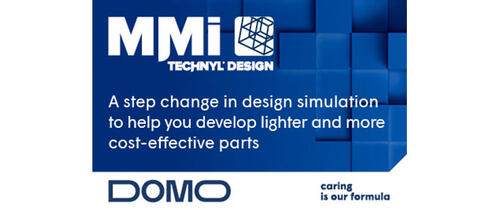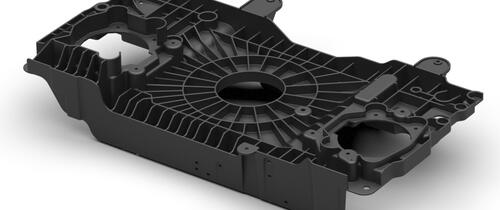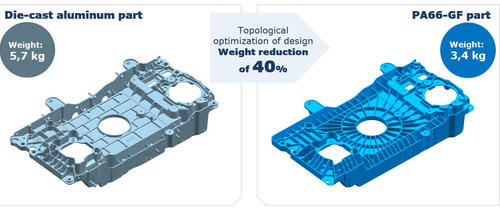DOMO provides a broad base of applications serving the automotive, industrial & consumer goods, and electric & electronic industries. It offers solutions to respond to the latest market trends, including lightweight materials, circular economy, thermal management, cooling systems, electrification, miniaturisation, and connectivity. One of its key business units, Engineered Materials, features the Technyl® and Domamid® lines, and 12% of its sales consist of recycled materials through its Technyl® 4earth® and Econamid® sustainable offering.
MMI Material Database
One of the ways DOMO is facilitating innovation and development for its customers is through its Material Database, the premier advanced mechanical modelling data resource. This is integrated in its MMI TECHNYL® Design predictive platform, a Multiscale modelling, Mechanical calculation, and Injection moulding simulation technology powered by Digimat.
Based on a development partnership with Hexagon e-Xtream, this complete material modelling and simulation technology enables accurate analysis of the behaviour of DOMO’s glass-reinforced polyamide materials. Harnessing the Digimat software suite, Hexagon e-Xtream ensures the package is optimised with the latest simulation methodologies.
DOMO has built one of the largest databases in the industry, with over 42,000 files in the MMI repository, covering more than 50 grades of PA6 and PA66. Moreover, these ‘material cards’ are not just limited to static load and failure, but also cover tests on a wide scope of dynamic parameters. These include impact, crash, vibration, modal frequency analysis, NVH, damping, fatigue, thermal dilation and warpage, moisture or glycol effects, and more. The files from this advanced database are made available to DOMO customers that have access to Digimat MX, and DOMO can also perform simulation support in-house on their behalf.
Meta-creation
Materials and properties are carefully measured under a wide range of conditions, including strain rate, tensile, shear, compression, temperature and humidity. An in-house methodology for identifying polyamide matrix parameters is employed based on glass fibre measurements, covering fibre orientation tensor and fibre length distribution. Machine learning is then harnessed to improve the efficiency of the various models, while also providing up to 15% greater accuracy compared to standard reverse engineering.
Equipment used for the specially-developed tests is monitored using a video extensometer that pilots the testing devices at constant strain rates, measuring true stress and strain. A CT scan is also utilized to check the complex interior microstructure and determine the fibre alignment. Metamodels are employed to reduce the number of tests required while retaining the high level of measurement accuracy, which otherwise would represent years of testing for 50 grades. The metamodel methodology enables excellent reliability since it is based on polymer physics, considering the effects of temperature, humidity and strain rate. Moreover, the database is updated regularly to maintain its high level of quality, accuracy and exhaustiveness of the physical modelling to address the most demanding applications of DOMO customers.
Intelligent innovation
With MMI, DOMO offers customers access to an exhaustive and high-quality database of polyamide mechanical modelling, with validation cases to ensure part performance predictability. The MMI suite represents a fully industrialized process, covering testing, reverse engineering, and smart model management. This suite of digital simulation tools is particularly appreciated when it comes to the complexity of metal replacement, notably in the case of electric vehicles.
OEMs and tier parts suppliers looking for metal replacement solutions can rely on MMI® Technyl® Design’s advanced predictive simulation tool to ensure optimal design integrity before moving to production. The DOMO team provides customers with the best data possible for the precise design of polyamide parts subject to stress in a variety of operating conditions.


